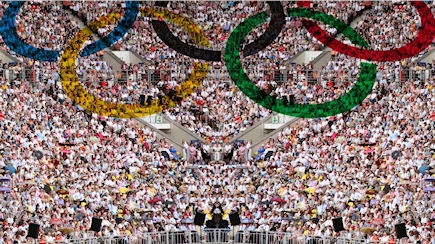This article first appeared in the Jul/Aug 2012 issue of World Gaming magazine.

Running, jumping, throwing and lifting
The Ancient Greek Olympians were all about who could run the fastest, throw the furthest, jump the highest, lift the heaviest weights and perform the most gravity-defying gymnastic feats. These events still form the backbone of the modern Games.
The heart and soul of all Olympic Games, the athletics events personify the Olympic motto, “Citius, Altius, Fortius,” which is Latin for “Faster, Higher, Stronger.” In the second week, the focus of the Games switches to the main stadium for nine days of intense athletics on both track and field.
With a total of 47 events offering the planet’s finest athletes 141 medal chances, super-human performances, upsets and world records will emerge. There is no such thing as a dull day during the athletics at the Olympic Games.
Who to watch: The unexpected is starting to become the expected for sprint god Usain Bolt so don’t be surprised if world records fall. Also look forward to the battle between Kenya and Ethiopia in the distance events, and Jamaica versus the USA in the relays.
Asia Pacific chances: Sally Pearson of Australia is the overwhelming favorite to win the women’s 100m hurdles and watch for China’s Liu Xiang in the men’s 110m hurdles to come through for a medal, quite possibly gold.
Gymnastics (Artistic and Rhythmic) and Trampoline:
The gymnastics are up there with swimming and athletics as the most eagerly awaited Olympic sports for fans to watch. The amount of work these athletes do is beyond comprehension. Some would argue the gymnasts put their bodies through inhumane torture, especially the girls who have such a small window of opportunity at the top level. Stars like Nadia Comăneci have thrilled crowds in the past and the pressure is equal to any sport in the world.
The artistic gymnastics utilizes the vault and floor exercises for both genders with men’s events then consisting of the pommel horse, still rings, parallel bars and high bar while the women compete on the uneven bars and balance beam.
The rhythmic gymnastics involves the performance of five separate routines with ball, ribbon, hoop, clubs and finally rope and is more about grace than brute strength, but no one can argue they aren’t remarkable athletes in their own right.
The trampoline is also a fantastic spectacle and consists of four events:
- Individual: athletes perform a sequence of aerial feats over 10 leaps.
- Synchronized: competitors do the same with a partner.
- Double mini trampolining: contenders runup to a smaller trampoline before performing two preliminary moves and then two final moves.
- Tumbling: involves an explosive series of flips and twists performed on a sprung tumbling track.
Who to watch: In the women’s gymnastic events the USA, Russia and China should be the ones battling it out for the gold medals. Make sure you watch some of the trampoline action as these guys get some serious height happening.
Asia Pacific chances: The men’s competitions may see another age-old battle between the Chinese and the Japanese, especially in the artistic gymnastics. The Chinese won the team all-around gold medal in Japan at the World Championships in 2011 with the locals capturing the silver.
You have to love a sport that encourages you to eat and lift heavy objects. The male heavyweights will be the biggest (and definitely the heaviest) athletes at the Games and half these guys will be so big they will struggle to walk out and address the bar.
There is nothing better watching the strain on the faces of these powerhouses as they lift weights that would crush a normal human into the ground. There are less medal events in this sport than in the past but in recent Games they have added women’s events.
Who to watch: Like boxing and judo, weightlifting is a sport that can see athletes from obscure countries win the ultimate prize and become national heroes overnight. Expect a good showing from the Russians and Eastern Europeans.
Asia Pacific chances: The Chinese are the Asian powerhouse in this sport, especially in the lower weight divisions. Look out for pocket dynamo and 2011 World champion Tian Yuan in the women’s 48kg class.
On the water
Being as it covers over 70 percent of the planet’s surface, mankind has become pretty adept at traversing water. Olympic events are all about doing this in style as competitors at the very pinnacle of their chosen discipline seamlessly interact with the maritime environment and pit their nautical skills against each other.

Pavol and Peter Hochschorner from Slovakia
Also known as white-water canoeing, this is the more spectacular of the two canoeing disciplines. Competitors must negotiate 25 gates, 6 of which go upstream, down the 250m white-water course.
Using either the two-bladed kayak paddle or the single-bladed canoeing paddle in solo and doubles events respectively, you’ll see mastery of control as the athletes seemingly defy common physics by maneuvering their vessels against a water flow moving at 13 cubic meters per second.
Who to watch: Twin brothers Pavol and Peter Hochschorner from Slovakia have won Olympic gold at three consecutive Games in the men’s C2 Slalom, their first coming in Sydney in 2000. Can they achieve an incredible fourth gold in 2012?
Asia Pacific chances: Australia’s Jessica Fox has been performing strongly on the World Cup circuit, and has to be considered a medal chance for the women’s K1 event. China has athletes qualified in all the canoe slalom events, though is fielding a young team following an almost across-the-board retirement since the 2008 Beijing Games. A longterm rebuilding plan may see some early success.
While canoe slalom pits man against course and clock, canoe sprint pits man against man in a bicep-burning battle to the finish line.
Held on the same course as the rowing at Eton Dorney, canoe sprint is a flat-water event requiring a single direction focus. There is one country per lane over the eight lane, 2,200 meter course, which features both kayak and canoe disciplines over distances of 200, 500 and 1000 meters.
Who to watch: Host nation Great Britain has major gold medal chances for their men with 2010 world champion Ed McKeever and reigning Olympic champion Tim Brabants. Raimundas Labuckas and Tomas Gadeikis of Hungary are a menacing sight as they power down the course in perfect harmony. Not to be missed.
Asia Pacific chances: In 2008 Ken Wallace emerged as Australia’s new flat-water champion, winning gold in the K1 500 meters and bronze in the K1 1,000 meters and he’ll be back looking for more of the same. Since the retirement of two-time gold medalists Meng Guanliang and Yang Wenjun, China is looking for some new stars from their young crop to build on the foundations set down by Meng and Yang.
For eight days the Eton Dorney rowing course will be teeming with some of the strongest and well-conditioned athletes at the Games. A wonderful array of events, from individuals to pairs to teams of four and eight offer sporting aficionados a feast of racing. Watch the strongest rowing nations clash in pursuit of the 14 prized gold medals.
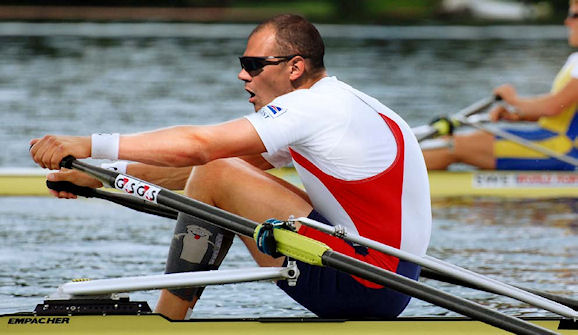
Norwegian rowing superstar Olaf Tufte
Who to watch: Rowers seem to have an amazing shelf life. For London 2012 it is the turn of Norwegian rowing superstar Olaf Tufte to attempt a third straight men’s single sculls gold. The lightweight women’s double sculls of the host nation will desperately want to turn their three silvers over the past three Games into a well-earned gold.
Asia Pacific chances: As defending Olympic champions in the women’s quad sculls China has the pedigree for a repeat performance, while from Australia, Drew Ginn and Duncan Free will be going for two in a row giving Ginn the chance for a fourth gold in as many Olympic appearances. Always go with experience!
The ten pieces of eight on offer should see sailors jibing, tacking and luffing their hearts out as they try to harness the power of the wind at the Weymouth and Portland sailing venue, down south in the old pirating and smuggling haven of Dorset. Arrr, me hearties.
Sailing is a somewhat complex affair. There are three disciplines – match racing (one against one), fleet racing (mass start) and windsurfing – not to mention 10 classes of boat. Crew sizes also vary from one to three.
Who to watch: Among the women, Spaniard Blanca Manchón in the RS:X class will play the conquistador role, hoping to (fairly and squarely) plunder the gold bounty, as will world champions Lisa Westerhof and Lobke Berkhout of Holland in the 470 class.
Asia Pacific chances: Australian sailing fans will be licking their salty lips at some great medal prospects. Mat Belcher and Malcolm Page, 470 world champions and World Cup winners, and Tom Slingsby, the laser world champion, are out to prove they can match it with the best on the Olympic scene. China is qualified to race in five of the ten classes of boat and will want to at least match their Beijing gold and bronze medals.
In the water
It’s possible to have just as much enjoyment in the water as on top of it though we doubt the Olympic contenders will have much time for fun and frolics, as they will be too focused on taking home the all-important gold medals.

There aren’t many more spectacular sports at the Olympics than diving. Anyone who has ever stood on a 10 meter diving platform and stared down at the water below respects what these prodigious professionals can do. They are incredibly skilled athletes with courage, grace, flexibility and poise.
While this used to be a sport where champions came from all over the world, the diving at recent Olympics has been dominated by China. The Chinese took over 50 percent of the medals on offer at the 2008 Beijing Games including all but one of the yellow-colored variety.
Who to watch: Anyone from China. Event-wise the 10 meter platform is always great viewing and expect the synchronized team events to be very pleasing to the eye.
Asia Pacific chances: Anyone from China. The majority of events will come down to the whether the Chinese athletes bring their A-game – they can conceivably win every event if they perform at their very best.
If the athletics are the showcase of any Olympics then many would argue that swimming runs a close second. The swimming kicks off in the first week before handing over the baton to the track and field for the second week.
Over 10 percent of the gold medals on offer will be decided in the water and there are always a few superstars that stand up and make the pool their own. There will also be a couple of bolters from left field that will swim up from the depths of obscurity to win that ever-elusive gold medal.
Who to watch: Michael Phelps has the chance to become possibly the greatest Olympian ever with a good showing in London. The American has every attribute but is four years older this time around and the field is starting to catch him.
Asia Pacific chances: Australia is a world powerhouse when it comes to swimming and they are always pushing the Americans. Watch James “The Missile” Magnussen who will be chasing four gold medals in the 50 and 100 meter freestyle and the two relays.
This sport is up there with the rhythmic gymnastics in regards to the most graceful on the Olympic program. You wouldn’t want to have a “who can hold their breath the longest” competition with these girls.
There are two gold medal events to be decided here with the pairs and the team events. It is a feast for the eyes in more ways than one and a spectacle that is worth looking at every four years.
Who to watch: The Russians have held a tight grip on the sport in recent times. They came away with all the gold on offer at the recent World Championships in Shanghai.
Asia Pacific chances: The Chinese will be the main contenders giving the Russians a run for their money, and will be looking for at least some minor medals.
Whatever you do, do not watch this sport underwater, unless you like your eyes watering. It’s a tough sport with the casualties being countless pairs of bathers and some of mankind’s more sensitive parts.
Similar to handball, the aim is to score goals in the opponent’s net, which sits on top of the water. It is seven-a-side, requires a freakish ability to stay above the water line with your hands in the air and you can’t touch the sides or bottom of the pool either.
Who to watch: Hungary, USA, Serbia and Montenegro. These teams love a good stoush and are likely to fight it out for the medals, no matter how many pairs of trunks it may cost them!
Asia Pacific chances: The Australian women have had a successful build-up to the Games and will hope to maintain their momentum for the real thing. The Aussie men gave China a lesson on the game in their build up with a 14-1 victory that should give them some confidence. The Chinese ladies defeated Japan to earn their ticket to the Games at the Asian championships.
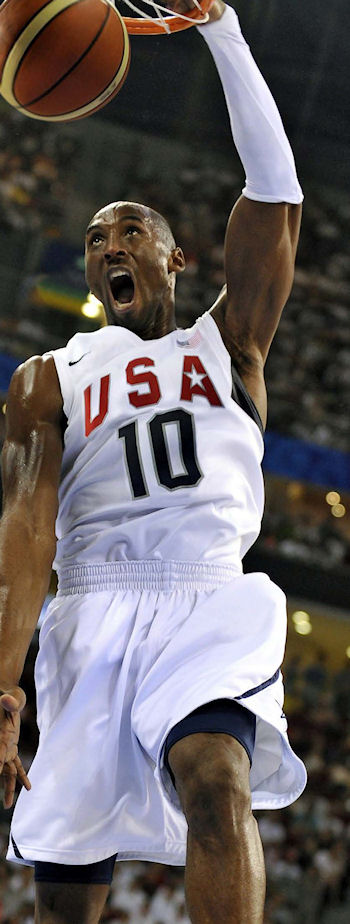
Team USA’s Kobe Bryant
Ball sports

Team USA’s Kobe Bryant
Modern ball sports have come a long way since the days of peasants kicking a pig’s bladder around a muddy field. This simple concept of playing with a ball has spawned a whole host of unique sports, each with their own tactics and idiosyncrasies – the prime example being badminton, where they don’t even use a ball…
A fast paced sport that is great to watch, especially when you become accustomed to the nuances of the game and how the shuttlecock travels. There are five medal events, just as in the tennis: men’s and women’s singles and doubles and mixed doubles.
Badminton, not unlike table tennis, is another sport that has taken Southeast and Central Asia by storm. It’s incredibly popular in the region and competing for Olympic gold is the pinnacle of the sport.
Who to watch: With China taking over 50 percent of the medals at the Beijing Games it’s a fair bet to expect them to totally dominate in London. Expect good showings from other Asian countries like Korea and Indonesia with the only significant challenge from the West coming from the Danes who are passionate about the sport.
Asia Pacific chances: The Chinese top the world rankings in every event apart from the men’s singles where a Malaysian (with Chinese heritage) Lee Chong Wei sits just in front of three Chinese players. The Koreans are strong in the doubles and the Indonesians are always competitive but the Chinese could conceivably take all five golds on offer.
This is one of the most interesting sports at the Olympics. The Americans are the best by far but it means less to them than the other teams competing. Winning an NBA title is still the highest accolade for a US player with the Olympics acting more as a showcase. The rest of the world regards the competition very seriously though. Basketball is a growth sport, great to bet on and will make for entertaining viewing.
Women’s basketball is also fantastic viewing and unlike some of the men this event means everything to the gals.
Who to watch: The American dream team is always worth watching with the biggest names in the game strutting their stuff. Even better would be if one of the Eastern European or South American teams came from the clouds and put the pressure on in the medal rounds.
Asia Pacific chances: China and Australia will be our best chances here. Make sure to watch if the Aussies face up to the Americans in the women’s gold medal game. There is no love lost here and it will be a fiery encounter.
Hopefully the sun will shine on the Horse Guards Parade beach volleyball arena, if only to keep the players warm. Instantly recognizable for an easy-on-the-eye dress code, this sport offers more to watch than just the ball.
Beach volleyball players are the envy of aspiring athletes. Making a living on the beach is a dream come true for these chilled out Olympians. There is a serious side however, and that is the competition for medals!
Who to watch: US pair Misty May-Treanor and Kerri Walsh are the undisputed queens of the sand, becoming the first beach volleyball team to win back-to-back Olympic titles after their victory in Beijing, the final being their 108th straight competition victory.
Asia Pacific chances: Xue Chen and Zhang Xi won bronze in 2008 for China and have been training hard in China’s beach playground of Sanya. Australia’s Tamsin Barnett and Natalie Cook, fifth in Beijing, will be back for London 2012 with Cook appearing at her fifth Olympic Games. The pair offer a true medal chance and after her stirring Sydney 2000 gold medal victory, Cook knows how to do it.
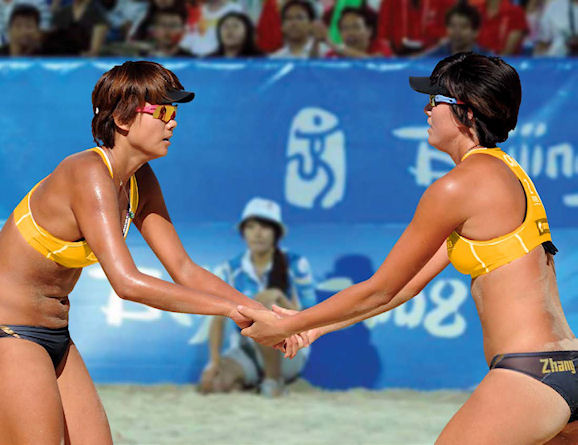
China’s Xue Chen and Zhang Xi
 Football (or soccer depending on your country of origin) is the biggest and most popular sport in the world. Whilst football at the Olympics is important, it is not the pinnacle of the sport. The men’s competition is an under-23 event with each competing country allowed only three older representatives of any age to help out the kids. The best thing is that it’s still football and is a great game to have a bet on.
Football (or soccer depending on your country of origin) is the biggest and most popular sport in the world. Whilst football at the Olympics is important, it is not the pinnacle of the sport. The men’s competition is an under-23 event with each competing country allowed only three older representatives of any age to help out the kids. The best thing is that it’s still football and is a great game to have a bet on.
The women’s event might be a little more interesting with no age restriction on players. The Olympics may also be the most important competition for the women’s game.
Who to watch: In the men’s competition Spain and England will be the European favorites with Brazil and Uruguay bringing some South American flair. In the women’s the US will be very hard to beat.
Asia Pacific chances: Both the Japanese and New Zealand have qualified for the men’s and women’s competition and will carry the chances for this part of the world.
A very Euro-centric sport, handball is a highspeed game with some good old-fashioned physical contact. You’ll see some big men and women leap towards the goal, trying to beat the keeper to score for their country.
Seven-a-side excitement is guaranteed in the Copper Box arena beginning with a preliminary phase of two groups of six. The four best teams from each group will qualify for the knockout phase.
Who to watch: Central and Eastern Europe and Scandinavia are the heartlands of the sport. Inspired by the outrageously gifted Nikola Karabatić and Thierry Omeyer, the current World and Olympic men’s champions are France. In the women’s draw reigning Olympic champions Norway, for whom Katrine Lunde Haraldsen pulls the strings, will have to deal with Russia who have been the leading nation in the last decade.
Asia Pacific chances: For Asia, South Korea has earned Olympic qualification for both the men’s and women’s competitions as Asian champions, and Japan has earned a berth for their women’s team.
An interesting sport that is truly international with teams from every corner of the globe competing for the ultimate prize. Winning a gold medal at the Olympics is the highlight of the sport. If you love football and don’t know much about hockey then just imagine it is a game of football played with sticks instead of your feet. It has very similar rules and play. The women’s game is one of the most hotly contended team sports in the world and the standard is as good if not better than the men’s.
Who to watch: In the men’s the European teams of Spain, Germany and the Netherlands will all be strong contenders, and will offer the main challengers to probable-favorites Australia. The best two teams in the women’s competition will be the Netherlands and the Argentinians.
Asia Pacific chances: The Australian men’s team will be very hard to beat. The women’s competition will see China, Korea, Australia and New Zealand in with real medal chances.
Table tennis is totally dominated by the Chinese. The biggest contention in this sport was who was actually going to represent China. Many of their great paddle experts will be missing due to the new strict restrictions on the number of players coming from any one country.

Germany’s Timo Boll
China has the top five players in the world in the official rankings in both men’s and women’s table tennis. The Chinese should win every gold medal on offer. For more on the Chinese table tennis team’s lead-up to the Games, read our article “Rallying for London” in our Nov/Dec 2011 issue. Just enter “rallying” in the search box on our website wgm8.com.
Who to watch: If you are looking for someone to challenge the Chinese then German Timo Boll has an outside chance of a medal. The Japanese and Koreans are also somewhat competitive.
Asia Pacific Chances: As we said it’s all China. All the Chinese players are good and will be clearly better than all their rivals.
Tennis is one of the sports that you could argue shouldn’t be in the Olympics and any world-class tennis player would rate winning a Grand Slam title as more prestigious than winning an Olympic gold medal. Having said that it will thrill the crowds and be a good sport to bet on. Most of the superstars will be there and will enjoy living it up at the A-list parties.
Who to watch: There are usually a few surprises in the tennis as the big name players aren’t as well prepared as they are for other big tournaments. Look for value bets and a couple of big upsets.
Asia Pacific chances: Our best chance for medals will be our women with China’s Li Na and Australia’s Samantha Stosur leading the way.
July 28 will see Earls Court spark to life for 16 days of hot volleyball action. A total of 12 teams in both the men’s and women’s competitions will fight it out, with the men’s gold medal match on the very final day of the Games.
Teams feature six players on the court and you could be forgiven for feeling a little short – height is a well-used commodity in volleyball.
Who to watch: At Beijing 2008, the men’s gold medal was won by the USA, while Brazil emerged victorious in the women’s event. With their world ranking of number six the men from the United States will find it difficult to defend their gold medal against world number one-ranked Brazil. Expect a Brazilian gold medal double.
Asia Pacific chances: The Chinese women’s team is determined to improve after their “disappointing” bronze in Beijing. This is good news for Asian volleyball as this kind of focused commitment often reaps dividends. The Chinese men’s team is in the mix, but may struggle with a world ranking of 10th.
Riding
Whether it’s the trusty horse or the newfangled bicycle, people have been riding something since time immemorial and the Olympics is the perfect forum for the best of the best to showcase their skills.
Giving credence to the sport as being truly an athletic event, not just a pastime, BMX racing at the Olympics is best described as fast and furious. Using skills similar to mountain biking, but with more jumps, a BMX race is an exciting sprint lasting around 40 seconds.
Riders explode out of the starting gate and power their way to find good position before the turns and jumps begin. A fast start is essential as you don’t want to find yourself left behind from the get go.
Who to watch: Shanaze Reade will once again be the favorite for gold in the women’s event, but this time around on her home turf she will not want to crash out as she spectacularly did in Beijing. If Reade can stay upright, she should win. For the men the only Olympic gold medalist in cycling from Latvia, Māris Štrombergs, will aim to hold his number one position from 2008 again in 2012.
Asia Pacific chances: Lead by teenager and two-time world junior champion Sam Willoughby, the Aussies are proven performers. Also with Willoughby is fellow Australian pro rider Khalen Young plus 2008 Olympian Luke Madill, who trains on a purpose-built track in his backyard. This is one of the very few sports that sees China without any qualifiers.
The off-road version of Olympic cycling is a relatively new addition to the Olympic family, but none-the-less is a popular attraction. For the athletes nothing short of peak physical conditioning is needed for over two hours of maximum effort.
Requiring handling skills far beyond other cycling disciplines, the small margin for error favors an almost freakish ability to control a bike on the rocky paths, challenging climbs and technical descents thrown at the riders by the Hadleigh Farm Mountain Bike track in Essex.
Who to watch for: Frenchman Julien Absalon – the two-time gold medalist is returning for a three-peat, but will be pushed all the way by Nino Schurter of Switzerland and Aussie Jared Graves in the men’s event. In the women’s Austria’s Anita Molcik, Romana Labounkova of the Czech Republic and Beijing champion Sabine Spitz of Germany are among the front-runners.
Asia Pacific chances: Chris Jongewaard is the highest ranked Australian rider amongst the men and is thus seen as their best hope at a medal. China has earned her two quota spots for entry into the Games, one each for the men and women.
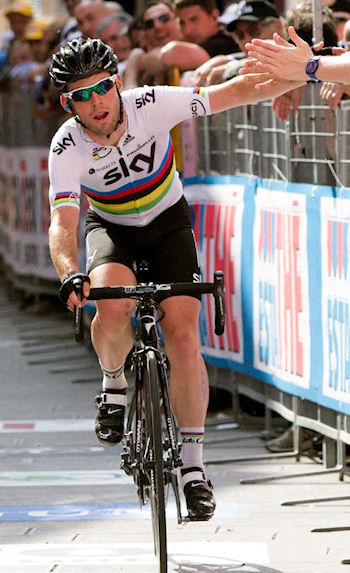
Great Britain’s Mark Cavendish
When the pretenders are gone, you will see some of the biggest names in road cycling employ tactics, strength, endurance and speed to win over the nine-lap course. With the road race traditionally won by a specialist sprinter, the time trial offers others a shot at gold.
Who to watch: Britain’s Mark Cavendish and David Millar, Australia’s Cadel Evans and Matthew Goss, Belgian Tom Boonen and Fabian Cancellara of Switzerland to name but a few. The list of names goes on and on, so we’ll let the competitors do the rest of the talking on the course.
Asia Pacific chances: China is without any road cycling qualifiers so let’s look to the Australians for the medals. Tour de France champion Cadel Evans is an obvious contender, particularly for the time trial, and Matthew Goss will be seeking revenge on Mark Cavendish after the Brit nudged him out of the World Championship title by just half a wheel.
The track cycling is always a popular event at any Olympic Games. The recipe is speed mixed with tactics and guts, served at up to 75 kilometers per hour in a big wooden bowl known as a velodrome.
There are 10 Olympic track cycling events to be held on the Siberian pine boards. Organizers built the “world’s fastest track”, tailoring the geometry with angles up to 42 degrees, then modified air conditions and temperature to optimize the chances for records to be broken.
Who to watch: The London locals will be looking to 36-year-old Games ambassador Sir Chris Hoy, holder of four Olympic gold medals including an incredible hattrick four years ago in Beijing, for more medals. Given he is the current keirin and men’s sprint world champion, we can assume he still has it. However, Australia’s Shane Perkins has other ideas and will be a major threat.
Asia Pacific chances: The clash between Australia’s Anna Mears and Great Britain’s Victoria Pendleton in the women’s sprint is set to be one of the Games’ finest spectacles. Barely a half tire width separated them in the World Championships in April, with Pendleton prevailing.
There are three forms of equestrian events at the Olympics: dressage, cross country and jumping with all three categories featuring both individual and team events. The most interesting thing is the fact that men and women compete on equal terms in this sport.
The dressage is about as boring as it gets with viewers simply watching a horse trotting around in a graceful manner. The cross country is exciting as both horse and rider are pushed to the limit, the jumping events are also great to watch as horses jump over a series of obstacles trying not to knock off the rails. Whether a teetering rail drops or clings on can be the difference between the ecstasy of victory and the agony of defeat.
Equestrian is not a cheap sport and is more commonly the preserve of royalty, landed gentry and Russian oil billionaires as the horses themselves are supreme athletes and very expensive to buy and keep. The majority of past winners have come from First World countries where such luxuries are more prevalent.
Who to watch: The Dutch, Germans, Brits and USA top the list as the most competitive. Watch the horses and admire their ability.
Asia Pacific chances: The Australians and New Zealanders have had success at the Olympics before and Aussie Edwina Alexander is an outside chance for a medal.
Fighting
Mankind has been perfecting the art of throwing, kicking and hitting each other as hard as they can since living in caves. The Olympic martial arts categories represent an exquisite blend of thousands of years of wanton violence honed to civilized, competitive perfection.
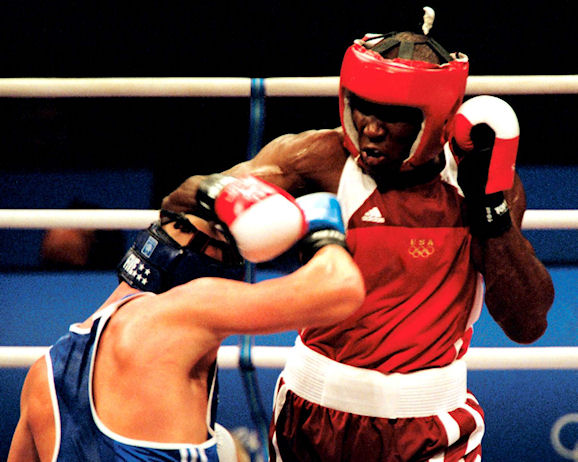
Boxing is a strange Olympic sport due to the fact that it is still an amateur event so is vastly different to the world of professional boxing. Some argue that it is still not a sport that should be associated with the Olympics.
However, with former World champions like Muhammad Ali, George Foreman and Oscar De La Hoya all being past Olympic gold medalists it is hard to argue that the sport does not belong at the Games.
There are 13 events at this Olympics including three women’s events, which will feature for the first time. The best thing about the sport is the scoring system that lets the viewers know who is in front.
Who to watch: The Cubans have always had a rich tradition in amateur boxing as do the Eastern Europeans. To be honest this competition is really a lottery, so expect the gold medals to be distributed all over the globe.
Asia Pacific chances: Look for the Asians in the lighter divisions where they stand a better chance. You really need to see the opening bouts to know who is going to challenge at the Games.
Italy’s Valentina Vezzali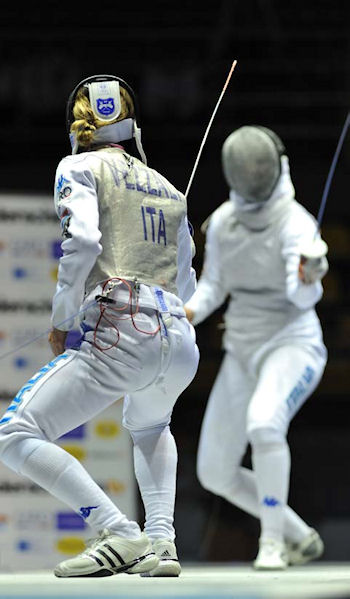
The testing sport of fencing is one of the five sports to have featured at every modern Olympic Games. It is a true test of presence, poise and patience as duelists must not only defend themselves, but also find a chink in their opponent’s defense before striking.
There are 10 events to be contested in London. The men and women contest individual sword disciplines of foil, épée and sabre. Then it’s team events in foil and sabre for the men, while women contest team épée and foil.
Who to watch: Veteran Valentina Vezzali from Italy, winner of five Olympic gold medals in the foil, could bring the curtain down on her epic career with a sixth gold. Germans Jörg Fiedler (épée) and Nicolas Limbach (sabre) are strong contenders, while Lei Sheng from China is the world’s best male foil fencer, but will have to fend off Japan’s Yuki Ota.
Asia Pacific chances: As well as looking to Lei Sheng, the rest of the Chinese team will have renewed confidence, having recently won the teams sabre event at the 2012 Moscow Sabre World Cup. The team has great credibility with Beijing individual sabre gold medalist Zhong Man. Dual Olympian sisters Jo and Evelyn Halls are poised for Australia’s first podium finish in London, bringing a wealth of experience and ability.
Judo:
Judo is all about throws and takedowns, not about striking blows. This sport may have gotten its name from the Japanese meaning “gentle way,” but make no mistake, there is very little gentleness on display when you watch the competitors battling it out on the mat for Olympic gold.
Judo became an Olympic sport in 1962 and continues to go from strength to strength. At the Beijing Games the Japanese and Chinese walked away with exactly half the gold medals on offer and we expect more of the same in 2012.
Who to watch: The sport is huge in countries like Azerbaijan, Mongolia, Georgia, Kazakhstan and Uzbekistan. It’s always great to watch small countries with limited sporting prowess do well at the Games.
Asia Pacific chances: We predict it will be another China versus Japan showdown in London.
Taekwondo, the national sport of South Korea, translates into English as “the art of foot and fist”, and is a sport that is as much about attacking as it is about defending. Knowing how to exploit both aspects is the secret to landing the big scoring strikes.
Three rounds of two minutes is all the fighters have to land accurate kicks and punches on the scoring area of their opponent. Patience only goes so far and it is one of the only sports to have a “sudden death” round, meaning taekwondo makes for scintillating viewing.
Who to watch: Not surprisingly South Korea dominated this competition in Beijing, winning four of the eight gold medals. Expect challengers to emerge from China, USA and Iran.

Asia Pacific chances: Apart from the South Koreans, China has a good pedigree at Olympic level, with a gold and a bronze last time around. The sport has spread throughout Asia, and the Korean secrets aren’t so secret anymore. Australia has medalled with under-49 kilogram class competitor Lauren Burns taking gold at Sydney in 2000. Safwan Khalil and Carmen Marton will fly the flag this time and will be hoping to hear the Aussie national anthem played in London in 2012.
Appearing on Grecian pots for millennia, not only is wrestling one of the most recognizable of the Olympic sports, it is also one of the most authentic representations of Olympic ideals. It is a true test of strength, technique, patience and poise.
The wrestling competition consists of two disciplines:
- Greco-Roman: athletes use their upper bodies and arms only
- Freestyle: athletes can use any part of their bodies
For all events, there is a direct elimination system that eventually decides the two finalists for the gold medal match.
Who to watch: The most powerful nations at the last Games were Russia, Japan and Georgia. Russia took no less than six of the available gold medals, with the other 12 being shared between 10 different countries. But even the most powerful Russian bear can be thrown to the mat.
Asia Pacific chances: Australia and China have firm medal prospects. Australia has its hopes pinned on sole wrestling representative, Farzad Tarash for a medal, and the Chinese will hope their wrestlers emulate their 2008 Beijing performance where they took one gold and two silver medals.
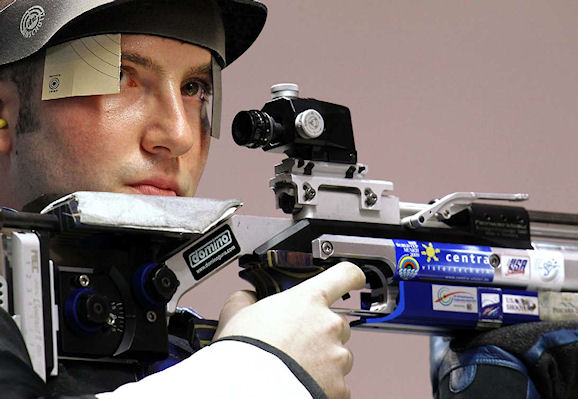
Niccolo Campriani of Italy
Firing
Over the centuries humanity has perfected the art of killing each other at range be it with bows and arrows or bullets and the Olympic categories of archery and shooting perfectly embody these lethal skills in an enlightened non-lethal competitive format.
The Lords cricket ground will play a fitting host to this chivalrous sport. The aim of the game is to shoot arrows as close to the center of the target as possible. Simple in theory, it calls for pinpoint accuracy and nerves of steel in practice.
While the tension will be tighter than the athletes’ bow strings, calls of “good shot!” coming from the 19th century pavilion at Lords will still be valid as the arrows fly over the hallowed cricket square.
Who to watch: Viktor Ruban of the Ukraine took gold in 2008 and will return to defend his title, no doubt relishing the challenge that looks set to come from 23-year-old American Brady Ellison – the first archer to win archery’s grand slam, dominating the “four majors” on the World Cup stage.
Asia Pacific chances: The new number one ranked female archer in the world, Ki Bo Bae, will be joined by Athens Olympic champion Lee Sung Jin and Yun Ok Hee, putting South Korea right up there. However, let’s not forget that by winning individual women’s gold in 2008, China’s Zhang Juanjuan ended the 24-year Olympic domination of South Korea in that event. Look forward to a China versus South Korea shoot-out in the women’s competition in London.
The founding father of the modern Olympic Games, Pierre de Coubertin, was a champion shooter as a young man, so there were no surprises when shooting was included in the first Olympic program in Athens in 1896. The shooting tradition continues at the Royal Artillery Barracks in 2012.
Shooting is now a three-disciplined affair (rifle, pistol and shotgun), with shooters adopting either a standing, kneeling or prone position. Shooters use highly sophisticated equipment, and shoot at stationary or moving targets from varying distances. Pierre would be proud!
Who to watch: Niccolo Campriani from Italy, the 10-meter air rifle men’s champion is one to watch, as is Peter Sidi of Hungary, while in the women’s events Barbara Lechner from Germany and Italian Chiara Cainero will be aiming for medals.
Asia Pacific chances: Australia has claimed at least a bronze medal in every Olympics since Atlanta in 1996, and has won four gold as well. Not as good as China though, who in 2008 won a total of eight medals, five of which were gold!
Hybrids
Some sporting events are neither one sport nor another and amalgamate several athletic disciplines. These are multi-skilled, highly competitive feats of athletic prowess where the crème de la crème of the sporting elite battle it out for fortune, glory and gold medals.
The modern pentathlon comprises épée fencing, freestyle swimming, showjumping horsemanship, cross-country running and pistol shooting. It is a truly unique event, and is the only event to be specifically created for the Olympics. Over a single day the competitors must first fence one another, swim 200 meters and then guide a horse they have known for just 20 minutes over a 12-jump course.

Australian triathlete Emma Moffatt
These scores are then converted into a handicap to determine starting times for the running and shooting segment. From now on it’s not points that count, but speed and accuracy. With competitors running a three kilometer cross-country course and firing as many shots as it takes to hit a target 5 times in no more than 70 seconds, it’s first across the line to take the gold!
Who to watch: The men’s competition looks set to be a battle between the Russians. Current Olympic champion Aleksander Lesun will be challenged by Andrei Moiseyev, while the ladies’ event should see 2008 silver medalist and hometown hero Heather Fell renew her rivalry with Beijing gold medalist Lena Schöneborn of Germany.
Asia Pacific chances: Chloe Esposito will represent Australia for the ladies and comes from a family with a fine sporting pedigree – her father Daniel competed in the Los Angeles Games in 1984. China’s Cao Zhongrong will look to improve on his 30th place in Beijing, joining fellow countryman Wang Guan in the men’s event, while Chen Qian and Miao Yihua will fly the flag for the women.
The largest of London’s Royal Parks, Hyde Park, will be host to hoards of spectators who will flock to see the triathlon action, a fast-paced race of endurance over land and lake.
Swimming 1,500 meters, cycling 43 kilometers and running 10 kilometers, a champion triathlete needs to be a master of all three trades, and jack of none. It will take nothing less than a masterful performance to achieve a gold medal in this event.
Who to watch: Australia and Switzerland are hotbeds of women’s triathlon and could carve up the medals between them with Emma Moffatt and Erin Densham representing the former and Nicola Spirig and Daniela Ryf the latter. Javier Gomez, the 2008 and 2010 world champion from Spain, Alexander Brukhankov from Russia and the German pair of reigning Olympic champion Jan Frodeno and Steffen Justus are all expected to be strong contenders for the men’s crown.
Asia Pacific chances: The return of Beijing Olympians Moffatt and Densham is particularly exciting for Australia’s triathlon medal hopes. New Zealand’s Bevan Docherty took silver in Athens in 2004, then came away with the bronze medal in Beijing. Will it be gold in London? He deserves it.

